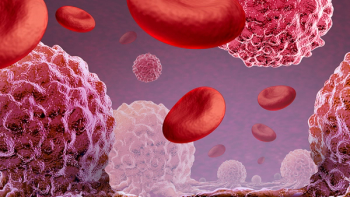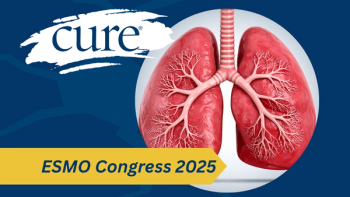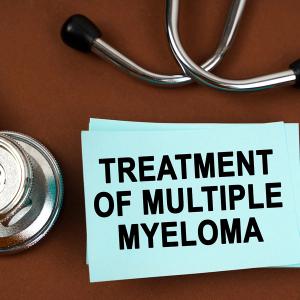
Newly diagnosed with cancer? This oncofertility guide covers egg freezing, sperm banking, and critical questions for your oncologist.

Newly diagnosed with cancer? This oncofertility guide covers egg freezing, sperm banking, and critical questions for your oncologist.

Learn about advanced treatments for stage 4 papillary thyroid cancer, such as radioiodine and targeted therapy, mapping the disease and managing side effects to empower your journey.

A stage 3 multiple myeloma diagnosis is significant, but new therapies are changing the outlook. Learn about your potential next steps.

Dr. Roshani Patel answers questions from patients with breast cancer on Keytruda-induced colitis, sugar intake during chemo, and how to stay active.

BOOG 13-08 shows skipping sentinel lymph node biopsy in patients 50+ with early-stage, hormone receptor–positive, HER2-negative breast cancer is safe.

Learn how diet and exercise impact breast cancer risk, while getting authoritative guidelines on plate balance, fiber goals, and complex vs. simple carbs.

Get expert insight into stage 3 oral cavity cancer, covering diagnosis, multimodal treatment and essential side effect management.

Dr. Katherine Crew discusses how new HER2-directed therapies are improving survival in metastatic breast cancer.

Elena Jeannotte discusses building a community of support for children with cancer and their families, especially during the holiday season.

Newly diagnosed with stage 3 prostate adenocarcinoma? Understand your diagnosis and explore multimodality treatment options for an informed cancer journey.

The phase 3 EPCORE FL-1 trial showed that adding Epkinly to Rituxan and Revlimid delivered superior PFS and response rates.

Venclexta regimens showed comparable progression-free survival versus continuous Imbruvica.

Newly diagnosed with stage 3 papillary thyroid cancer? Get the facts on treatment options and side effects to guide the conversation with your physician.

Dr. Anne Chiang explains how biomarker testing and molecular profiling personalize lung cancer treatment and compare tissue versus liquid biopsies.

Todd Kennedy, a multiple myeloma survivor, explains how switching from an hours-long IV infusion to a 3-minute Sub-Q injection changed his life.

Stage 2 multiple myeloma can feel overwhelming. Learn what it means, treatment options, and key questions to discuss with your oncologist.

The artwork of Gail Durant, winner of the annual CURE Calendar Contest, captured the heart of her family’s connection to home and the cancer journey.

Understand your stage 2 oral cavity cancer diagnosis, explore primary treatment options and get key questions for your oncologist.

A young cancer survivor who underwent external beam radiation therapy and brachytherapy at 14 years old discusses her rare diagnosis, side effects and the nonlink to her Turner syndrome.

Choosing treatment for stage 2 prostate cancer? Get the facts on surgery versus radiation and learn to manage possible side effects such as erectile dysfunction.

Alecensa cut the risk of death by 22% versus Xalkori, with median overall survival reaching 81.1 months versus 54.2 months in advanced ALK-positive lung cancer.

Here is a basic guide to what you need to know about stage 2 papillary thyroid cancer.

Get the facts on stage 1 multiple myeloma, including why your doctor may recommend active surveillance and what the latest treatment options are.

Dr. Matthew Matasar discusses why stem cell transplant is still a standard, life-saving option in blood cancers and how CAR-T cell therapy is changing treatment decisions.

In PD-1/PD-L1-pretreated recurrent/metastatic head and neck squamous cell carcinoma buparlisib and paclitaxel was not associated with a survival improvement.

Sacituzumab tirumotecan cut risk of progression or death by 51% versus chemotherapy in EGFR-mutated NSCLC after tyrosine kinase inhibitor resistance.

In patients with extensive-stage small cell lung cancer Imdelltra plus chemoimmunotherapy was associated with positive outcomes.

Understand why early detection gives you the best chance, explore your surgery or radiation options, and plan for survivorship with oral cavity cancer.

This stage 1 prostate cancer guide explains diagnosis, Gleason scores and the choice between surgery, radiation and active surveillance.

Kelly Dyckman discusses the mind-body connection during cancer care, offering tools for coping with diagnosis and intimacy struggles.

Published: October 3rd 2025 | Updated:

Published: June 9th 2021 | Updated:

Published: August 22nd 2025 | Updated:

Published: June 8th 2021 | Updated:

Published: November 2nd 2025 | Updated:

Published: October 9th 2025 | Updated: